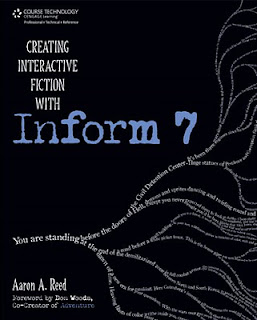For the past month I’ve been amusing myself with a wonderful language: Inform7. It is a very domain-specific language in that its main application is authoring text adventures (oh, sorry, ‘Interactive Fiction’), and produces the Z-code or Gluglx bytecode when compiled.
There are several reasons I really shouldn’t enjoy this language so much:
- It uses natural language, which I initially thought was a terrible choice for language design. I’ve always treasured brevity and conciseness in code, but I may have to reconsider. True, Inform7 code is pretty verbose and sometimes a bit repetitive, but at the same time it flows like easy to read prose, kind of like Knuth’s literate programming.
- It comes with an IDE, which you are strongly encouraged to use. Normally I’m a die-hard emacs guy who only uses Eclipse as a last resort, but in this case it works pretty well. There is integrated documentation, a system for structured code, and testing facilities especially tailored for helping you run through different branches of you interactive stories.
Coding in Inform7 is an interesting experience. The code reads a lot like regular english, but of course it isn’t really natural language. There is still a basic level of syntax you have to adhere to, even if the parser does some fairly intelligent disambiguation of terms and lets you describe you world in a lot of alterative ways.
Yes, ‘describe your world’. That pretty much sums it up; a program is mostly a description of you model game world, with rooms, objects and behaviours. This is a trivial treasure collecting game in five lines of code (including the title):
"Treasure Hunt" by Fredrik Appelberg
Treasure Hill is a room. The description is "A green and abundant hill,
with a view of the surrounding fields. It makes an excellent
starting point for your treasure hunt."
The chest is an closed openable container in Treasure Hill. It contains a
gold coin.
The player is carrying a brass lantern. The player is wearing a cloak.
Every turn when the player is carrying the coin: end the story saying "You
won!"
Describing an object is the same as creating it. Here I create a room (with a descriptive text), a chest with a gold coin inside, a lantern and a cloak held by the player. The cloak is interesting: since I state that the player is wearing it, Inform7 is able to infer that it is a piece of clothing (an object subclass that has its own set of properties) without me having to say it. Also, I’ve explicitly stated that the chest is a container (another subclass), but in this example that’s not really necessary, since the compiler can infer that from the fact that there’s a coin inside the chest. However, I’ll leave it like this since it makes the text a bit easier to read.
For me, this is a very novel way of coding, and reminds me of the Prolog hacking we did at the university: programming is mostly just stating facts about the world, and trusting the compiler to handle the rest.
Compiling and running is as simple as pushing a button. This is what a transcript of the game looks like:
Treasure Hunt
An Interactive Fiction by Fredrik Appelberg
Release 1 / Serial number 110211 / Inform 7 build 6G60 (I6/v6.32 lib 6/12N) SD
Treasure Hill
A green and abundant hill, with a view of the surrounding fields. It makes an excellent
starting point for your treasure hunt.
You can see a chest (closed) here.
>i
You are carrying:
a brass lantern
a cloak (being worn)
>x chest
You see nothing special about the chest.
>open it
You open the chest, revealing a gold coin.
>take the coin
Taken.
*** You won! ***
In that game you scored 0 out of a possible 0, in 4 turns.
Would you like to RESTART, RESTORE a saved game, QUIT or UNDO the last command?
But that’s just my simple play-through. If you like, you can try the game yourself, without leaving your browser. That’s right: Inform7 also generates a simple website for your game, complete with a z-code interpreter written in javascript.

If you don’t hear from me for a while, it’s probably because I’m busy hacking my first serious game. It’s taken me longer than anticipated, but that doesn’t bother me. Writing with Inform7 is such joy that I can’t help myself.
By the way, I thought I’d take the time to plug Aaron Reed’s excellent Creating Interactive Fiction With Inform 7. It’s one of the most inspiring programming books I’ve ever read. And I’ve been through a few.